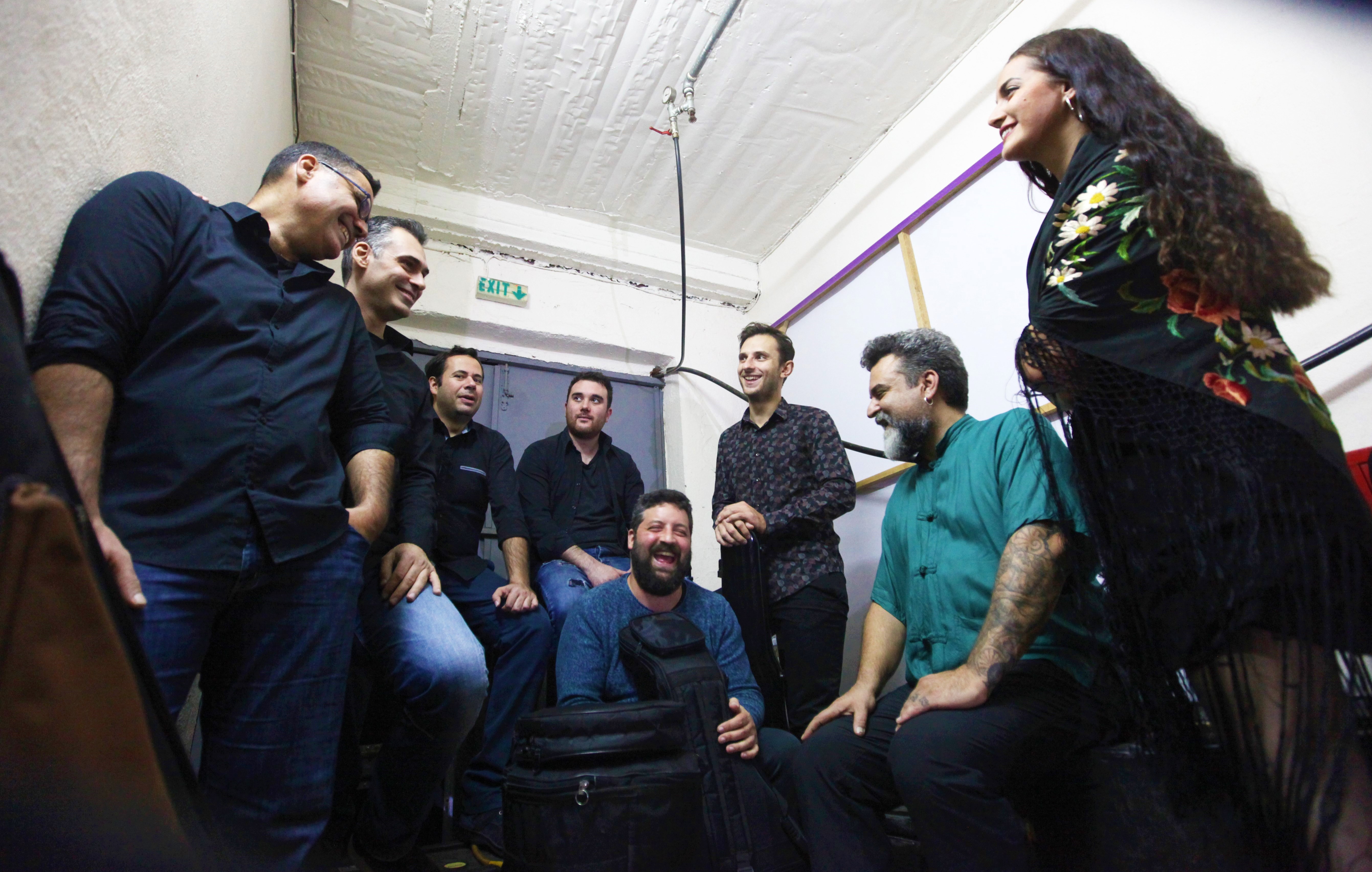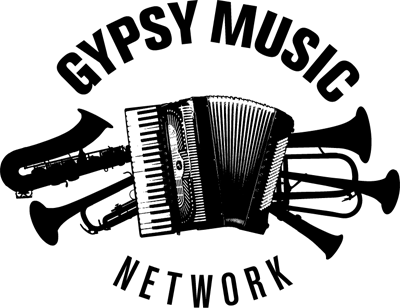"I grew up in a house with four gramophones and full of stringed instruments!"
Following a break of seven years, Loxandra Ensemble of Greece has finally come back on the scene with new music. “In Transition” is the name of their great new album. Loukas Metaxas is one of the founding members of Loxandra Ensemble. Global Music Network spoke with him about the early days of the band and their journey to “In Transition”.

Hi Loukas. How long has Loxandra Ensemble existed and what was the motivation to found the band?
Loxandra Ensemble started out as a quintet back in 1997 playing music of the taverns (called “Meyhane” in Turkey, “Café Aman” in Greece) mostly from the multicultural Istanbul, Smyrna and urban centers of Greece from the 19th century until around 1930, with the style and instruments of the old generation of musicians back then. Between 2003 and 2006 the band regrouped to become a sextet and expanded its repertoire (to include many tunes and styles of the Eastern Mediterranean, the Balkans and music from regions of the Caucasus). Loxandra Ensemble regrouped once again from 2012 to 2014 to become an octet, with almost no limitation to the repertoire, music style or orchestration. The motivation to found the band from the start, along with the periods of regrouping it, was, is and always will be: to play music that we love in a way that we find interesting!
Why did you choose the name "Loxandra" back then?
“Loxandra” is the title of Maria Iordanidou’s book, first published in 1963, about her grandmother Loxandra, who was born in Constantinople in the times of Abdulmejid I, the 31st Sultan of the Ottoman Empire, who reigned from 1839 to 1861. The 19th century was the time of reforms which established, on paper at least, the freedom of belief and equality of all citizens of the Empire before the law. Loxandra personalizes the lifestyle, generosity, enthusiasm, spirit and general culture of the Greeks of Constantinople. The music we played when Loxandra Ensemble started out was 90% about the music of the people of that same time, so we found it a good idea to name the band after the name of the famous heroine of Maria Iordanidou’s book!
When did you actually start making music?
I grew up in a musical family, in a house with four gramophones and full of stringed instruments. Among other things, my father was a painter and manufacturer of old style instruments of the bouzouki family until the mid-80s. He was a very good amateur singer and still writes lyrics. His grandfather was from Fanari (Fener) of Constantinople, a silk trader (as my family name betrays) and also an amateur folk music instrument maker.
My first contact with music was the songs of old Constantinople and Asia Minor composers, the early rebetiko music of Piraeus heard on the gramophone and listening to my father’s friends in their private parties mostly in our home or in the tavernas of Athens. His friends included Stelios Keromytis a.k.a. “Boubis”, Prodromos Tsaousakis, Vassilis Tsitsanis, Giannis Stamatiou or "Sporos", Iordanis Tsomidis, Christos Constantinou, Giannis Moraitis and many others…
My first attempt to make music was before I was of school age with a small baglamadaki, trying to “imitate” the fingers of my older brother Nikos, who was an old style bouzouki virtuoso from the age of 9!
How do you find the ideas for your songs and how do you normally create a Loxandra song?
We don’t have a “norm” or a special pattern that we always follow.
Most of the time one of us comes up with an idea which can be some melodies of his own, or a new “point of view” of an old song, then someone else gets inspired and plays his own instrument upon it and all of a sudden we all propose new ideas to each other and develop it together!
Not all tracks are made that way, though. For example, some of us found it interesting to do an instrumental version based on a classical “academic” form of Eastern music, but with melodic “idioms” of the music of the central Greek shepherds. After a month or so, Thanos (our kanun player) came to rehearsal with the score of his composition “Çoban saz semaisi”! In that case, we all worked as a team again, but only for the orchestration and final sound.
There were seven years between the last album and "In Transition". What took you so long?
There are many reasons for that. One perhaps was that our previous CD “Meyhane-Kafe Aman” was recorded, mixed and mastered in more than a dozen different studios, in 8 different cities, in 4 different countries, with 27 guests! After that, we gave priority to playing live very often, rather than thinking of a new CD production. Another reason is that we went through (and are still going through) a period of regrouping the band. We went from being a 6-member band to an ensemble of 8 musicians, with 4 new members and myself changing instruments from percussion to bass… Another reason still (and one we are very happy for) was that we were waiting for the right label to be interested in releasing and spreading our work beyond Greek borders, rather than being released only in Greece and/or Turkey as with our previous productions.
There is a great video for the song "Ti se mellei esenane". What's that song about?
It is about a young migrant woman from Smyrna, who addresses an Athenian man, following the catastrophe of her homeland (catastrophe of Smyrna or fire of Izmir 1922, editor's note), asking him:
“Why do you care where I come from?
“What (does it matter to you) if I come from Karatasi or Kordelio (coastal aristocratic neighborhoods on opposite sides of Smyrna)?
Why do you care and keep asking me which village I come from, darling, since you do not pity me and keep tormenting me?
(All you need to know is that) …from the place I come from, they know how to love, they know how to hide their grief and they know how to have fun!
(So)… why do you care and keep asking me which village I come from, since you do not love me?”
Can you be heard live soon?
Yeah, we'll finally be on tour in January 2019. We visit Switzerland (Bern, Mühle Hunziken), Hungary (Budapest, MUPA), Austria (Vienna, Sargfabrik), Germany (Aachen, Domkeller) and Belgium (St. Niklaas, Muziekclub ´t Ey ). And after that we will be on the road again in April. Among others in Germany and Switzerland. You can find all information on our website.
We are a “live” band! We also love to work in recording studios when having “fresh material”, but we really enjoy performing and sharing our music live with our listeners!!!
Especially now, after years of preparing “In Transition” and the latest regrouping of the band, we are very eager to play and perform anywhere, from small venues (that can handle an 8-member band with high standards regarding sound setup) to music halls and festivals all over the world!!!
We are a “live” band! We also love to work in recording studios when having “fresh material”, but we really enjoy performing and sharing our music live with our listeners!!!
Especially now, after years of preparing “In Transition” and the latest regrouping of the band, we are very eager to play and perform anywhere, from small venues (that can handle an 8-member band with high standards regarding sound setup) to music halls and festivals all over the world!!!
Your closing words to Loxandra listeners:
We really love what we do, but it would be impossible for us to enter the third decade of our existence as a band, having the same enthusiasm and excitement, without having YOU!!!
It is really YOUR love and support that keeps us trying to create music and become better and better all these years!!!
Please subscribe to our YouTube channel and our website and visit our live shows!!! A big thanks to all of you, from our listeners and world music lovers to radio producers, journalists and everyone who supports us!!!
Listen In Transition on Spotify:
Loxandra Ensemble on Youtube:
Interview: Robert Lippuner / Global Music Network
Translation: Jamie Davies
















